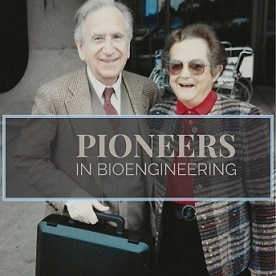Arnost Fronek, M.D. Ph.D. (1923-2020) and Kitty Fronek, M.D. Ph.D. (1925 - 2018)

Arnost Fronek, M.D. Ph.D. (1923-2020) and Kitty Fronek, M.D. Ph.D. (1925 - 2018)
Arnost Fronek, M.D. Ph.D., Professor Emeritus in Bioengineering and Surgery passed away at his home on June 8, 2020. He was born in 1923 in Czechoslovakia. After the Nazi invasion, he escaped to Palestine, where he studied electronics and enlisted in the Czech Brigade of the British Army. When the war was over, he enrolled in the Medical School at Charles University in Prague, Czechoslovakia and joined the Cardiovascular Research Institute of the Czechoslovakian Academy of Science, completing his medical training and Ph.D. degree.
His wife of 67 years, Dr. Kitty Fronek, who partnered with him in life and in scientific research, predeceased him in 2018. She was born in France and lived in Czechoslovakia, where after surviving three years imprisonment at a Nazi concentration camp in occupied Czechoslovakia, she entered medical school and completed her M.D. and Ph.D. at Charles University in Prague. She met Arnost Fronek, her future husband and collaborator, when they were students at Charles University. After medical school, she also joined the Cardiovascular Research Institute, being one of the first to develop an animal model of experimental hypertension, allowing her to provide in vitro testing of new anti-hypertensive medications. Together they succeeded in a daring escape from Czechoslovakia with their two children in 1964. They lived in Vienna, Austria, until they emigrated to the United States, securing jobs in Philadelphia. Arnost Fronek was Associate Professor in the Bockus Research Institute, Graduate School of Medicine of the University of Pennsylvania, Kitty Fronek was in charge of the experimental surgery lab at Temple University before they join the University of California, San Diego in 1968.
Drs. Arnost and Kitty Fronek were both recruited by Dr. Benjamin W. Zweifach and joined the newly formed Bioengineering group in the Department of Applied Mechanics and Engineering Sciences, a precursor of today’s Department of Bioengineering, at UC San Diego. As medical investigators, their appointment in 1968 was a critical step in coalescing Bioengineering studies, research and education into a new profession with an explicit health care medical research direction. It consolidated the basis for education and research that placed UCSD Bioengineering as one of the foremost centers for this activity in the United States and the world.
Arnost Fronek played a central role in steering the Bioengineering curriculum to the area of cardiovascular physiology and blood flow in health and disease, introducing engineering students to the analysis of the mechanics, role and pathologies of blood flow, and the uniqueness of a system that had to be studied employing non-invasive techniques. Clinical blood flow measuring procedures was an area that he was uniquely qualified to present. Among his many scientific accomplishments, in the 1950s, with Dr. William Ganz, he pioneered the method of measuring cardiac output using thermodilution with a catheter positioned in the pulmonary artery. He was one of the inventors and initial developers of the Swan-Ganz catheter, which allows on-line blood pressure, flow and oxygenation measurements from the right-side heart chamber in awake patients. The technique is commonly used to this day. He became best known for his research on non-invasive diagnosis, especially famous for his establishing the use of post-occlusive reactive hyperemia and pulse-reappearance time as the gold standard for the diagnosis of arterial diseases. His 1989 book entitled ”Noninvasive Diagnostics in Vascular Disease” became the international standard in the field.
Arnost Fronek maintained a keen interest throughout his career in the application of electronic techniques to obtain patient medical data for supporting the diagnosis of circulatory insufficiency, and related clinical patient’s problems. He was Director of the Cardiovascular Laboratory in Bioengineering while maintaining his research and medical practice at the UCSD Medical Center Hospital, where he was stationed throughout the major portion of his UCSD career as Professor of Surgery. He maintained this long and extensive relationship with Bioengineering, and actively worked with its electronics group that helped to design, test and calibrate his instruments and develop electrical measuring techniques for plethysmography applications, monitoring minute tissue volume changes, providing diagnostic data for non-invasively evaluating changes in tissue blood flow in response to pharmacological interventions.
Arnost Fronek was a senior practicing M.D. who, together with his wife Kitty Fronek provided the significant medical component to the development of UCSD Bioengineering into a discipline aimed at improving human health. As a Research Physiologist, Kitty Fronek was also directly involved with the Bioengineering group since the start of her UCSD career in experimental areas of atherogenesis and blood flow regulation, actively collaborating with Prof. Zweifach. Their work formed a center of attraction for European investigators, who established long-standing collaborative programs with UCSD Bioengineering. In 1988 Arnost Fronek was recipient of the prestigious Humboldt Research Fellowship Award by the Federal Republic of Germany.
Both Kitty and Arnost Fronek were highly supportive of each other’s work and presented a unified view, ideas, and experience of two diverse but converging approaches to the science and practice for the treatment of peripheral vascular disease. Their unity in diversity and enthusiasm for the science and medicine that they developed and promoted was recognized in scientific and medical circles, leading to being amicably referred to as the “Dynamic Duo” of the peripheral circulation research.
Arnost and Kitty Fronek are survived by their children, Drs. Zdenka and Jan Fronek, both of whom continue the medical tradition in the Fronek family.
Marcos Intaglietta, Ph.D.
Geert W. Schmid-Schoenbein, Ph.D.
